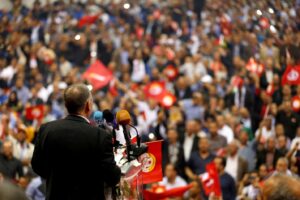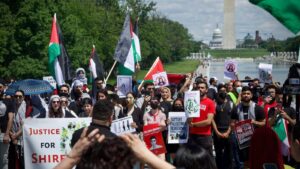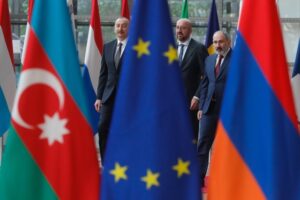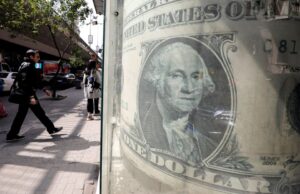
The National Interest Foundation Newsletter
Issue 148, May 26, 2022
Welcome to our NIF Newsletter. In this week’s headlines: pro-democracy advocates condemn Tunisian President Kais Saied’s unilateral move to exclude political parties from the process of drafting a new constitution and accuse him of seeking to consolidate autocratic rule, the Palestinian Authority formally asks the International Criminal Court to investigate the reprehensible killing of journalistShireen Abu Akleh, Azerbaijan and Armenia announce the establishment of a joint border commission to address issues related to theNagorno-Karabakh region, and Egypt faces financial difficulties and the possibility of defaulting on its loans.
Saied’s Unilateral Moves in Tunisia

The powerful Tunisian General Labor Union has refused to take part in a limited dialogue to draft a new constitution, citing the anti-democratic actions of Tunisian President Kais Saied. (Photo from Reuters)
Pro-Democracy Advocates Condemn Tunisian President Saied’s Unilateral Move to Exclude Political Parties from the Process of Drafting a New Constitution
Pro-democracy advocates have condemned a recent move by Tunisian President Kais Saied to exclude any political parties from the drafting process for a new constitution, and accused him of attempting to consolidate autocratic rule. Saied handpicked the organizations that would participate and unilaterally appointed a loyalist law professor to head the body. These included only 4 organizations, the Tunisian General Labor Union (UGTT), the employers’ organization UTICA, the Tunisian League of Human Rights, and the National Bar Association. The Tunisian General Labor Union along with many academics have already said that they will not participate, due to concerns about Saied’s continued anti-democratic measures and the limited dialogue structure proposed. “We reject any formal dialogue in which roles are determined unilaterally and from which civil and political forces are excluded,” UGTT Spokesperson Sami Tahri said. The UGTT is Tunisia’s most powerful labor union and holds a great deal of political clout. The union of over 1 million members has also recently threatened to call a strike of all workers in public services and state companies.
President Kais Saied’s moves to seize power have pushed Tunisia into the biggest political crisis since the 2011 Arab Spring and have threatened to destroy many of the democratic gains made during the uprisings. Civil society organizations, opposition groups, and activists have labeled his actions a coup. Saied has tried to deny this and argue that his “reforms” are needed to save Tunisia from political gridlock, however each new measure and effort to erode the country’s democratic institutions fuels further criticism of his behavior. He has dissolved the parliament, disbanded a watchdog organization within the Tunisian government that ensured judicial independence, and personally renamed the replacement to an independent electoral commission. While he enjoyed some initial support of his early actions last July because of frustration with political gridlock and socioeconomic conditions in the country, opposition to Saied has grown in recent months as the nature of his autocratic reversals has become more apparent.
Tunisia’s economy and public finances are also in crisis. The government is currently in talks with the International Monetary Fund for a rescue package amid growing poverty and hardship. So far, all proposals have been shut down. The economic crisis is still ongoing and there is no real end in sight. The rising cost of commodities such as fuel and food has put a strain on the people of Tunisia. There are widespread protests around the country as well whereby citizens are voicing their discontent over Saied’s march towards one-man rule. Many of those protesting are concerned that they will lose the rights and liberties that were gained during the revolution. “Our peaceful resistance will continue in the street until we restore our freedom and democracy,” said one of the demonstrators, Tijani Tizaoui. Tizaoui had also participated in protests during the Arab Spring.
Saied’s power grabs and unilateral decisions have destroyed many of the democratic institutions he claims to be wanting to save. The way to initiate useful reform should include all relevant stakeholders, and not just a select few who would have likely operated in a limited capacity. The Saied regime has indicated that it will proceed with or without the civil societies appointed. It was likely expected that these organizations would refuse to take part in the constitutional process, so inviting them may well have been aimed at trying to give the proposed reforms some merit. However, ultimately, the exclusion of the necessary political parties from the process delegitimizes it as a whole.
Calls for Probe into Abu Akleh Killing

Abu Akleh’s killing at the hands of Israeli forces has drawn global condemnation and demands for a transparent investigation. (Photo from Middle East Eye)
The Palestinian Authority Formally Asks the International Criminal Court to Investigate the Reprehensible Killing of JournalistShireen Abu Akleh
The Palestinian Authority has submitted a file to the International Criminal Court (ICC), formally asking the tribunal to launch an investigation into the heinous killing of journalist Shireen Abu Akleh. The reputable Palestinian-American reporter was fatally shot by an Israeli sniper while on assignment in Jenin, with the killing sparking widespread outrage and condemnation. There has been an array of calls regarding the need for a credible probe. Recently, more than 50 U.S. lawmakers signed a letter requesting that the State Department and the Federal Bureau of Investigation (FBI) intervene and lead a probe due to the disturbing circumstances of the case and Abu Akleh’s American citizenship. Prominent global figures have also weighed in. During this week’s World Economic Forum in Davos, Qatari Emir Sheikh Tamim bin Hamad Al Thani made remarks urging the international community to dedicate deserved attention to the longstanding injustices like this being perpetrated against Palestinians. Ultimately, rights and social justice activists have outlined the importance of accountability for such continued Israeli abuses in order to prevent them from committing these types of crimes with impunity.
The death of journalist Shireen Abu Akleh has elicited deep anger because of the blatant culpability of Israeli forces in her killing, as verified by video and first-hand accounts at the scene. Abu Akleh was covering an Israeli military raid near the Jenin refugee camp in the illegally-occupied West Bank when she was fatally shot in the head despite wearing a clearly marked press vest. Video evidence by esteemed human rights group B’Tselem immediately refuted the disgraceful and misleading initial Israeli claims that Abu Akleh was killed by Palestinian militant gunfire, and new footage that has emerged over the preceding week showed that no gunfighting was taking place in the area where she was shot prior to the incident. Furthermore, eyewitnesses stated that Abu Akleh had been targeted by an Israeli sniper, and that there was no crossfire that could have indicated she was accidentally shot and killed.
Due to the aforementioned elements of the case, Palestinians, social justice activists, and others are calling on the ICC to initiate a transparent and thorough investigation. This includes more than 100 celebrities and artists who have also signed a statement demanding accountability. In it, they remark that: “The killing of Shireen Abu Akleh is a grave breach of international humanitarian law and an attack on journalism and freedom of expression. UN and international human rights experts have said that it may constitute a war crime and should be subject to an independent, transparent international investigation. These crimes are part of a pattern of violence, harassment, and intimidation against Palestinian journalists who are shining a light on what Amnesty International, Human Rights Watch, and Israel’s leading human rights organization, B’Tselem, have described as a system of apartheid imposed on the Palestinian people.” The signatories of the letter additionally pointed out that governments should implement the same type of punitive measures against Israel that have been placed on Russia in response to its illegal and destructive invasion of Ukraine.
Unsurprisingly and as expected, the Israeli army’s military police criminal investigation division expressed that they did not plan on launching a probe into the killing. Thus, there is even more need for strong international pressure on the ICC to spur a fair investigation and ensure accountability for deplorable crimes like the killing of Abu Akleh.
Azerbaijan-Armenia Joint Border Commission

The agreement to hold talks to address ongoing issues between Azerbaijan and Armenia has been hailed as a notable breakthrough. (Photo from EPA)
Azerbaijan and Armenia Announce the Establishment of a Joint Border Commission to Address Issues Related to theNagorno-Karabakh Region
Government officials of Azerbaijan and Armenia have recently agreed to establish a joint border commission to address issues relating to the contentious Nagorno-Karabakh region. They reached the arrangement during a meeting in Brussels this past weekend. The gathering was held by the European Council, and hopes to help kickstart a wider negotiation process between the two countries. The respective leaders also agreed to hold other preliminary talks in an attempt to reach a bilateral treaty. The longstanding disputes over the Nagorno-Karabakh region flared into a recent six-week war back in late 2020, whereby Azerbaijan regained a large amount of territory. The leaders of Azerbaijan and Armenia have consented to meet on the border itself within days of agreeing to hold the talks. Part of the preliminary agreement also included the reopening of the Zangezur corridor, which will allow Azerbaijan access to its Nakhchivan exclave.
The four main issues that will be discussed during these talks are border issues, connectivity, socio-economic development, and creating a more permanent peace deal. The border issues remain at the heart of the conflict and will likely be a deciding factor for the other aspects of the talks. The opening of roads and railways will also be discussed. This will hopefully allow for an easier flow of food and medical supplies. There will also be talks to further develop the economic ties first established in January of last year between the two countries. All of these issues will likely be dependent on a comprehensive deal, but the fact that an agreement was made to talk is a big step towards sustainable peace and will also hopefully lead to a stabilization of the entire region.
There may, however, be some obstacles. The Armenian Prime Minister Nikol Pashinyan has received harsh backlash, as a wave of protests in the Armenian capital claim that the Prime Minister is conceding too much to Azerbaijan. The opposition party in Armenia has continued to fuel the protests. This contention could have the ability to throw a wrench in the peace process, as domestic pressures could force Armenians to begin to make unrealistic demands. Russia, which has relations with both countries and had recently played the role of mediator between them, is currently occupied with its invasion of Ukraine. This destructive and widely-criticized invasion has also made them a global pariah and taken away a lot of credibility they had on the world stage.
The conflict between Azerbaijan and Armenia in the modern era over the contentious Nagorno-Karabakh region has been in existence since 1920, when the two countries first engaged in armed fighting. The Russian-backed Azerbaijanis took control of the region. When the Soviet Union began to fall apart, the occupants of Nagorno-Karabakh voted to become part of Armenia and declared independence from Azerbaijan. This led to a two-year war starting in 1992. The Armenians were able to seize the Nagorno-Karabakh region and the areas around it, with that iteration of the conflict ending in 1994 with a ceasefire agreement. However, this was largely ignored and tensions remained high with sporadic fighting that eventually escalated into the most recent war back in late 2020. Both sides have accused each other of atrocities, and there have been credible impartial findings supporting this as well. Thus, experts and observers are hopeful that the plans to remain engaged in talks will prevent the outbreak of another major armed conflict.
Egypt’s Financial Difficulties

The Egyptian economy is on the verge of a crisis due to rising costs and crippling debt. (Photo from Reuters)
Egypt Faces Financial Difficulties and the Possibility of Defaulting on Its Loans
As the new fiscal year begins, Egypt is on the brink of a colossal economic crisis starting in July. The country is suffering from a myriad of problems including a massive $30 billion deficit, one of the world’s worst debt-to-GDP (gross domestic product) ratios, a rapidly rising inflation rate, and a looming food crisis and shortages exacerbated by the ongoing war in Ukraine. Egypt also has increasingly high interest rates and a weakening currency causing further investor weariness. With few clear plans or initiatives to combat this crisis from the Egyptian government, economic experts warn that the circumstances will worsen for Egyptian citizens. It is feared that this dwindling of economic conditions will have ripple effects on the state of human rights within Egypt, which is already of concern under the El-Sisi regime.
Egypt’s economic conditions are a blend of various miscalculations, frivolous spending, and a global crisis affecting the international community. As the fiscal year in Egypt begins, the nation will already be starting with a $30 billion deficit. Egypt has one of the largest public debts among Arab nations as well, at a whopping $409 billion. The nation’s debt-to-GDP ratio is within the bottom-tier global economies. Additionally, Egypt is highly sensitive to the potential tightening of global monetary policies as a result of its large deficits because of structural reliance on food and energy importing. As such, higher prices of products like wheat and oil, which have skyrocketed in light of the ongoing war in Ukraine, can have a devastating impact on the state of Egypt’s economic affairs. Egypt’s finance minister himself has warned about the increase in food prices triggered by the destructive Russian invasion of Ukraine, and the effect this could have on food insecurity and humanitarian conditions. Egypt has been hit particularly hard by wheat shortages, being that it is the world’s largest importer of the grain. This is especially troubling because the Egyptian government runs a large-scale subsidized bread program that nearly 70 million citizens rely on.
Like many global nations, Egypt has also been deeply affected by the Covid-19 pandemic. The country’s tourism market and its service industry are at the foundation of its economy, and thus strains on these sectors have had a damaging impact. Along with this and the wheat crisis is the ongoing phenomenon of rising global costs and inflation. The recent United States Federal Reserve interest rate hike has meant that many countries like Egypt have limited options to support their higher gross external financing needs. On top of that, Egypt has taken on expensive projects including multi-billion-dollar ones such as a high-speed rail system and a new nuclear power plant. The nation has also spent billions on a brand-new capital city as well.
The looming economic crisis has yet to see a comprehensive strategy to combat these issues. Economic experts predict that Egypt will be forced to increase interest rates considerably. The lack of action from the Egyptian government alerts human rights activists that the living conditions of Egyptians will likely worsen. While little large-scale action can be taken before the July fiscal year start date, observers hope that some forward-looking strategies can be implemented to try and combat the prospective economic devastation.
